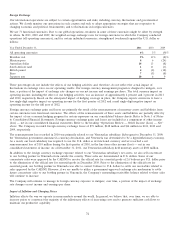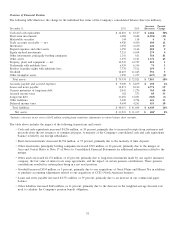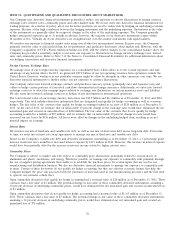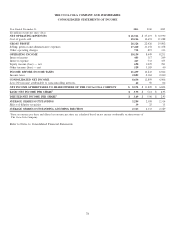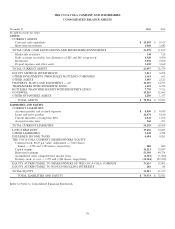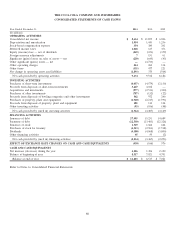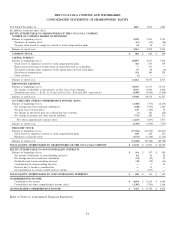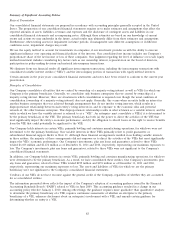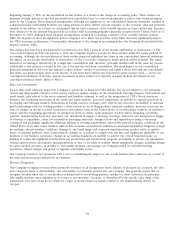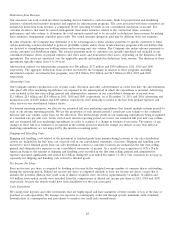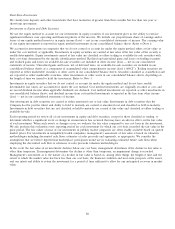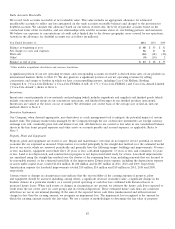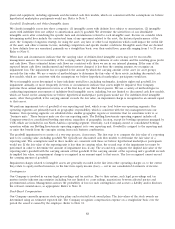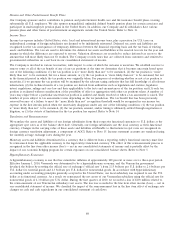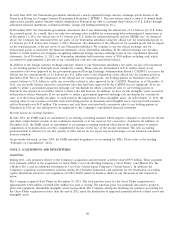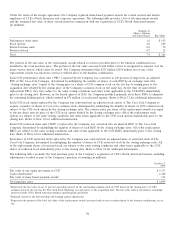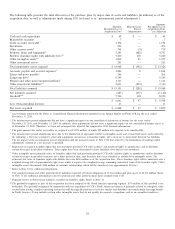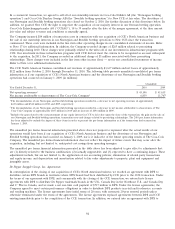Coca Cola 2011 Annual Report Download - page 86
Download and view the complete annual report
Please find page 86 of the 2011 Coca Cola annual report below. You can navigate through the pages in the report by either clicking on the pages listed below, or by using the keyword search tool below to find specific information within the annual report.Beginning January 1, 2010, we deconsolidated certain entities as a result of this change in accounting policy. These entities are
primarily bottling operations and had previously been consolidated due to certain loan guarantees and/or other financial support
given by the Company. These financial arrangements, although not significant to our consolidated financial statements, resulted in
a disproportionate relationship between our voting interests in these entities and our exposure to the economic risks and potential
rewards of the entities. As a result, we determined that we held a majority of the variable interests in these entities and, therefore,
were deemed to be the primary beneficiary in accordance with accounting principles generally accepted in the United States as of
December 31, 2009. Although these financial arrangements resulted in us holding a majority of the variable interests in these
VIEs, the majority of these arrangements did not empower us to direct the activities of the VIEs that most significantly impact
the VIEs’ economic performance. Consequently, subsequent to the change in accounting policy, the Company deconsolidated the
majority of these VIEs.
The entities that have been deconsolidated accounted for less than 1 percent of net income attributable to shareowners of The
Coca-Cola Company in 2009. On January 1, 2010, the Company began to account for these entities under the equity method of
accounting. Although the deconsolidation of these entities impacted individual line items in our consolidated financial statements,
the impact on net income attributable to shareowners of The Coca-Cola Company in future periods will be nominal. The equity
method of accounting is intended to be a single line consolidation and, therefore, generally should result in the same net income
attributable to the investor as would be the case if the investee had been consolidated. The main impact on our consolidated
financial statements in 2010 was that instead of these entities’ results of operations and balance sheets affecting our consolidated
line items, our proportionate share of net income or loss from these entities was reported in equity income (loss) — net in our
consolidated statements of income, and our investment in these entities was reported as equity method investments in our
consolidated balance sheets. Refer to Note 6.
Risks and Uncertainties
Factors that could adversely impact the Company’s operations or financial results include, but are not limited to, the following:
obesity and other health concerns; water scarcity and poor quality; changes in the nonalcoholic beverage business environment and
retail trends; risks related to the assets acquired and liabilities assumed, as well as the integration of CCE’s North American
business; the continuing uncertainty in the credit and equity markets; increased competition; an inability to expand operations in
developing and emerging markets; fluctuations in foreign currency exchange rates; interest rate increases; an inability to maintain
good relationships with our bottling partners; a deterioration in our bottling partners’ financial condition; increases in income tax
rates or changes in income tax laws; increased or new indirect taxes in the United States or in other major markets; an inability to
renew collective bargaining agreements on satisfactory terms or strikes, work stoppages or labor unrest (including at bottling
partners’ manufacturing locations); increased cost, disruption of supply or shortage of energy; increased cost, disruption of supply
or shortage of ingredients, other raw materials or packaging materials; changes in laws and regulations relating to beverage
containers and packaging; significant additional labeling or warning requirements; unfavorable general economic conditions in the
United States or in other major markets; unfavorable economic and political conditions in international markets; litigation or legal
proceedings; adverse weather conditions; damage to our brand image and corporate reputation from product safety or quality
issues, or negative publicity, even if unwarranted; changes in, or failure to comply with, the laws and regulations applicable to our
products or our business operations; changes in accounting standards; an inability to achieve our overall long-term goals; an
inability to realize the significant benefits from our productivity and reinvestment program; an inability to protect our information
systems against service interruption, misappropriation of data or breaches of security; future impairment charges, including charges
by equity method investees; an inability to successfully integrate and manage our Company-owned or controlled bottling
operations; climate change; and global or regional catastrophic events.
Our Company monitors our operations with a view to minimizing the impact to our overall business that could arise as a result of
the risks and uncertainties inherent in our business.
Revenue Recognition
Our Company recognizes revenue when persuasive evidence of an arrangement exists, delivery of products has occurred, the sales
price charged is fixed or determinable, and collectibility is reasonably assured. For our Company, this generally means that we
recognize revenue when title to our products is transferred to our bottling partners, resellers or other customers. In particular,
title usually transfers upon shipment to or receipt at our customers’ locations, as determined by the specific sales terms of the
transactions. Our sales terms do not allow for a right of return except for matters related to any manufacturing defects on
our part.
84


